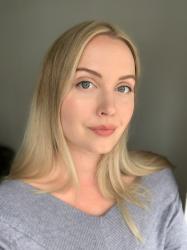Personal health is something many people erroneously put off for a number of reasons—be they emotional, practical or, in some cases, financial. For women of foreign origin living in Iceland, these reasons are complex and multifaceted. Enter the Her Voice 2021 Conference, which set out to raise this long-overdue discourse.
Organising ideas
Chanel Björk Sturludóttir and Elínborg Kolbeinsdóttir are the founders of Her Voice (Hennar Rödd), a non-profit organisation focused on centering the voices of foreign women in Iceland. Since its founding in 2018, the pair have joined Chanel’s personal experience as a woman of mixed heritage with Elínborg’s academic background in human rights and democratisation as the basis of their work.
“It’s common knowledge that people have all sorts of different backgrounds, and race is not necessarily connected to national identity,” Chanel shares in our interview. Íslenska mannflóran, a radio show she produced for RÚV about multiculturalism in Iceland—with a name meant to represent the diversity of people—”became a catalyst for a lot of other projects, including this one.”
“Especially after the Black Lives Matter movement began last year, people really want to learn and understand what prejudice looks like in Icelandic society,” Chanel explains. “The population is becoming so much more diverse, so this is something a lot of people are asking for.”
Human rights, health and Her Voice
Her Voice 2021 took place at Borgarleikhúsið on October 2nd. After First Lady Eliza Reid delivered the opening remarks, women of diverse backgrounds shared the stage to offer insight into how the Icelandic healthcare system works—or doesn’t work—for women of foreign origin.
“I felt it necessary to have a human rights perspective,” Elínborg said. “I took a course in international women’s health and human rights, which helped inspire the theme for our conference this year. Of course, the Covid situation made the issue even more timely.”

Photo by Art Bicnick
Unique obstacles in accessing healthcare exist for women of foreign origin living in this country. “One of the major struggles these women face is due to the language barrier and the interpretations services they receive,” Elínborg explained. “Some women will go to the doctor with a family friend and the doctor will speak to the family member but not straight to the patient. So of course it can feel as if the doctor isn’t listening to them.” This can cause added uncertainty during times which may already be frightening for patients.
“They’re treating you,” Shantaye Brown, author and deputy member on the board of W.O.M.E.N. shared in a panel on this topic, “You should know what’s going on. You should have that peace of mind. Nobody else.”
Forward movement
Participants of Her Voice 2021 demonstrated the urgent need for improved and diversified language services as well as widespread cultural sensitivity training across Icelandic healthcare services. At the same time, the call for women who are impacted by these issues to be brought into meaningful positions where they’re able to exact change was omnipresent.
“We need to empower people of diverse backgrounds to decision-making positions,” said Nichole Leigh Mosty, the US-born director of the Multicultural Center. “We need to see people of foreign origin in high seats on electoral lists in local politics. We need to see them pushed up in government agencies. […] We need to have space to be agents of change.”

Photo by Art Bicnick
“There was no tragedy that happened to me,” Jade Alejandra, founder of The Sila II Act shared regarding an experience in Icelandic healthcare as a person of multicultural heritage. “The tragedy was that it didn’t need to happen. We live in such a privileged country.”
Support the mission of Her Voice by becoming a member for the 2021-2022 operating year at https://hennarrodd.is/membership.
Buy subscriptions, t-shirts and more from our shop right here!


















